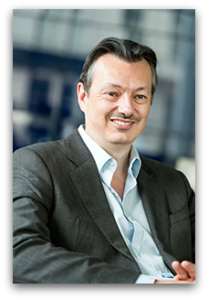 Registration for the ECS Conference on Electrochemical Energy Conversion & Storage with SOFC-XIV, convening in Glasgow, July 26-31, 2015, is now open. The plenary session will feature Nigel Brandon, Director of the Sustainable Gas Institute at Imperial College London.
Registration for the ECS Conference on Electrochemical Energy Conversion & Storage with SOFC-XIV, convening in Glasgow, July 26-31, 2015, is now open. The plenary session will feature Nigel Brandon, Director of the Sustainable Gas Institute at Imperial College London.
Prof. Nigel Brandon OBE FREng is also Director of the UK Hydrogen and Fuel Cells Hub, and Co-Director of the UK Energy Storage Hub. He held research positions with BP and Rolls-Royce before joining Imperial College as a Senior Lecturer in electrochemical engineering in 1998.
In 2000 he was a founder of the fuel cell company Ceres Power, acting as CEO to 2003, CTO to 2006 and Chief Scientist to 2009. He was appointed to the Shell Chair in Sustainable Development in Energy in 2005 and the BG Chair in Sustainable Gas in 2014.
He was the UK focal point with China in energy and climate change from 2007 to 2011, and Senior Research Fellow in Energy to the UK Research Councils from 2005 to 2014.
Prof. Brandon was awarded the Royal Academy of Engineering Silver Medal in 2007, and the ASME Francis Bacon Medal in 2014, for his contribution to fuel cell science, engineering and technology.
He leads a research group focused on the science and engineering of electrochemical devices for energy applications, with a particular focus on fuel cells, redox flow cells, and batteries.
Five Questions with Professor Nigel Brandon
How did you become interested in electrochemical power and fuel cells?
My PhD was in electrochemical engineering, under Prof. Geoff Kelsall at Imperial College. When I joined the BP Research centre after my PhD I was exposed to the energy challenge, and with my research background became involved in some work on fuel cells. But my interest in fuel cells really took off when I moved to Rolls-Royce, to join a newly formed fuel cell team. There I was one of the inventors of the Integrated Planar Solid Oxide Fuel Cell.
Who has been the biggest influence on your scientific career? Why?
My PhD supervisor, Prof. Geoff Kelsall, set me on the right path. Then when I joined Imperial College as a member of academic staff it was real pleasure and education to work with the late Prof. Brian Steele, from whom I learned a huge amount about the relationship between materials science and device engineering.
What are some of the roadblocks in implementing widespread use of renewable energy?
The cost and maturity of technology is of course vitally important. But so are the attitudes of consumers, developers and policy makers. We need the technology to be available, and we need a demand for its widespread use.
What kind of growth have you seen in young people’s interest in energy technology?
I have spent my whole career working in the energy sector, and there has been an enormous change in people’s interests and attitudes. Many people now hold a strong opinion, good or bad, about energy technologies and the energy industry. This is reflected in the interests of young people, many of whom are very interested in working in clean and sustainable energy technologies.
What do you do for fun?
When family duties allow, my wife and I enjoy collecting and viewing art and sculpture, working in our garden, and traveling.
About Prof. Brandon’s Talk
Title
Electrochemistry in energy applications: policy drivers, commercial opportunities and research challenges
Description
The role and value of electrochemical technologies such as fuel cells, lithium batteries, flow batteries, supercapacitors, and electrolysers in delivering a secure and sustainable energy system will be analyzed and discussed. In this context, commercial opportunities for these technologies will be introduced in the near, medium and long term, and the research challenges, and associated opportunities for innovation, will be highlighted.

